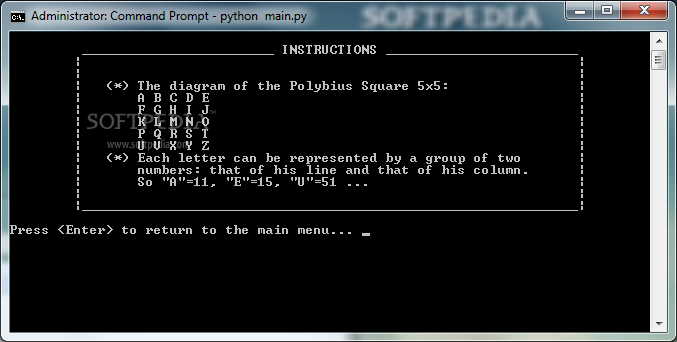

I think I'd start by splitting it into two pieces, one to encrypt and one to decrypt. If you expect every character to be upper case, either (1) tell the user (not recommended) or (2) upper case the string yourself: std::transform(input.begin(), input.end(), input.begin(), ::toupper) For example, for(int i = 0 i for std::isspace. Use ranged-based loop instead of index loop. Use auto to simply some variable definitions if you want to: // std::vector coords = getCoords() Don't allocate memory if you don't have too (this might actually not allocate memory for the std::string, due to SSO actually). SquareIJ doesn't have to be a std::string, it can be a simple char. Your choice variable really wants to be an enum instance: enum class mode
#Polybius square decoder online code
When compiled with -Wall, your code produces 2 same warnings: warning: comparison between signed and unsigned integer expressions It's not that messy IMO, but there are a few things which you could have done better:Īlways compile code with every warning turned on, and fix them. This code, in my opinion, is quite messy. The getCoords() function gets a string, and then tokenizes the string into a vector of strings, each corresponding to the coordinates of a character.Įxample of "encryption": Encrypt or decrypt = eĮxample of "decryption": Encrypt or decrypt = dĬoordinates (separate with spaces): 12 11 44

The getChoice() function simply gets the e or d character to choose encryption or decryption. As shown in the unordered map and char array, the numbers correspond to the row and column on a 5x5 square: The Polybius square is a simple way to assign characters numbers, and then "encrypt" and "decrypt" based off of those numbers. Since it is an uncommon cipher, it is nowhere on Code Review.Īlthough the program technically works, it ended up very messy. I attempted to recreate the Polybius square, also called the Polybius checkerboard, which was used in Ancient Greece for cryptography.


 0 kommentar(er)
0 kommentar(er)
